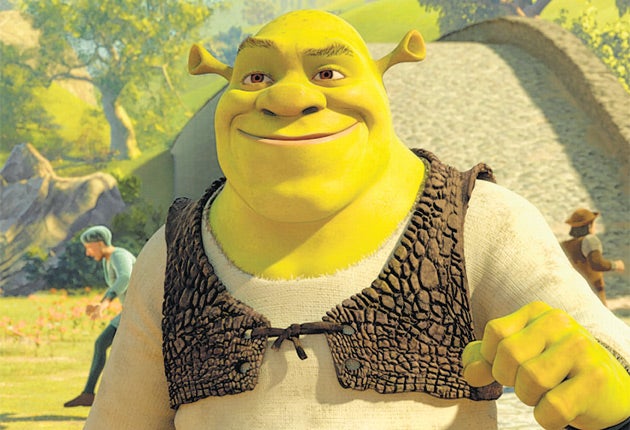Shrek Forever After (U)
A wonderful life, warts and all. Leave your thoughts on the last film in the series below.

The fourth and, we are assured, final instalment of the Shrek saga finds the ogre-hero in pin-sharp 3-D but suffering a loss of mojo. The first three films were about personal insecurity: Shrek (voiced by Mike Myers) began by feeling unworthy of love, then unworthy of royalty, then unworthy of fatherhood. Now he's sitting pretty, in a manner of speaking, a husband to Princess Fiona (Cameron Diaz), father to three cute ogrelings and a celebrity to the tourists of Far Far Away. But far from being contented, he's just "a jolly green joke", and not all that jolly if his boorish behaviour at his daughter's birthday party is anything to go by. He wants to go back to a time "when the world made sense", when his life was his own and people were frightened of him.
In short, Shrek Forever After addresses a midlife crisis, which will perhaps have a deeper resonance for parents than it does for children. The series has always been canny in its cross-generational appeal, treating kids to a robust repertoire of slobbishness (farting, belching, mud-bathing) and grown-ups to a more sophisticated brand of cultural and cinematic in-jokes. So try and spot what's being referenced here: Shrek happens upon a shifty-eyed stranger, name of Rumpelstiltskin (Walt Dohrn), who offers him the chance to have his old life back. On signing a contract, the ogre exchanges a day from his past for one in which he can revert to being a scary, unregenerate, child-free gadabout. Too late does Shrek realise that the day he has surrendered is the very day he was born, thus creating a parallel world in which Rumpelstiltskin is a tyrant king and Shrek himself doesn't actually exist. Yes, you've guessed it – we are in a digimated version of It's a Wonderful Life, where the hero discovers how life would have been without him; as it were, Shrekless.
It essentially enables the film-makers to replay Shrek from the start, in a world where nobody recognises him. He now finds that Donkey (Eddie Murphy) is enslaved to the ogre-hunting witches who boss things in Rumpelstiltskin's regime, and Puss (Antonio Banderas) has ballooned into a pampered fat cat who can no longer fit into his boots. These and other transformations license a range of visual gags that put the sly into silly, like the sight of Puss awkwardly shinnying down a rope on his claws, or of Cookie the gingerbread man engaged in gladiatorial combat with a bunch of animal biscuits. It's not quite the gaudy horror that James Stewart found when he returned to his hometown in the Capra movie, but it's bad enough. I half-expected Princess Fiona to have turned into Paris Hilton, or Miss Piggy; instead, she's a warrior queen leading an ogre resistance movement. The catch is that Shrek can annul his disastrous contract with Rumpelstiltskin only if he gains "True Love's Kiss" and thus undoes the mischief he has set in train. But feisty Fiona has eyes only for the revolution, not for a love-sick lummox she doesn't know.
While these twists of characterisation are well-handled, and the pacing of the story is spot-on, there is not the joyful verve that drove along the early Shrek. Its pastiche of fairytale figures, including the Three Little Pigs, Pinocchio and the Pied Piper, blend with throwbacks to Hollywood's golden era, such as the malevolent witches from The Wizard of Oz and the castle-bound derring-do from The Adventures of Robin Hood. In the villainous Rumpelstiltskin you may discern a cross between Uriah Heep and the carrot-topped Syndrome from The Incredibles. Punctuated by Donkey's frequent song contributions – The Carpenters, Lionel Richie, The Monkees – and the Pied Piper's mesmeric flute-playing (he dances them into submission) the movie becomes a virtual echo-chamber of myth and pop culture. The downside of all this magpie borrowing is that it has mostly lost its power to surprise. It is always competent, but it is seldom thrilling.
The film-makers have tried to freshen the formula by hiring cult names to do vocal work, though in truth the characters voiced by Jon Hamm (from Mad Men) and Jane Lynch (from Glee) were so minor I barely noticed them. Walt Dohrn, a storyboard artist and writer on the film, did the test voicing for Rumpelstiltskin until someone realised he was good enough to do the real thing. Of the regulars, Eddie Murphy nails most of the best lines in motormouth style, and one lightning exchange with the gingerbread man ("What you talkin' about, cracker?") is so subtly clever I was initially unsure if it was deliberate or not. You get the feeling, though, that the characters have been taken as far as they can go. Shrek has run the gamut of personal crises, and disaffection with family life is a blind alley that only the parallel-universe flip can allow him to escape. There is a recurring appearance in this movie of an outsize goose, pet of Rumpelstiltskin – presumably the Goose That Laid the Golden Egg. That's pretty much what Shrek has done for DreamWorks; now the studio should do the sensible thing and crack it before the whole thing goes rotten.
This week's Culture Club is looking for your opinions on Shrek Forever After; leave your thoughts below.
Subscribe to Independent Premium to bookmark this article
Want to bookmark your favourite articles and stories to read or reference later? Start your Independent Premium subscription today.

Join our commenting forum
Join thought-provoking conversations, follow other Independent readers and see their replies